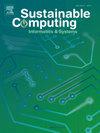Architecture and sustainability assessment of cable multi-state monitoring system driven by green computing
IF 5.7
3区 计算机科学
Q1 COMPUTER SCIENCE, HARDWARE & ARCHITECTURE
引用次数: 0
Abstract
The rapid development of urban infrastructure requires the development of advanced monitoring systems for the continuous assessment of cable health to guarantee operational reliability, safety, and long-term sustainability. The research proposed a novel Cable Multi-State Monitoring System (CMSMS) leveraging the computational capabilities of Edge compute allied with Green Computing principles to recover energy consumption and monitor. The suggested system employs heterogeneous sensors for real-time data acquisition, capturing dangerous cable parameters such as temperature, vibration, and strain. Pre-processing includes handling missing values and feature extraction using Discrete Wavelet Transform (DWT) to enhance the quality and relevance of the sensor data. Edge devices, clearly low-power platform such as Raspberry Pi and NVIDIA Jetson, serve as dispersed nodes for local data processing. These strategies permit the categorization of cable conditions into three discrete states: normal, degradation, and fault prediction, thereby support early detection of potential cable failure. For fault detection, the system includes an Extreme Gradient Boosting (XGBoost) model to adeptly handle complex, non-linear interdependencies with sensor data. Its parallel processing capabilities significantly improve computational competence, making it well-suitable for edge-based application. To further reduce energy consumption, the Shuffled Frog Leaping Algorithm (SFLA) is employed for the optimization of system parameters; ensure a balance between computational performance and energy efficacy. A comprehensive sustainability valuation is conduct to evaluate system performance, converging on energy consumption, processing speed, and fault detection accuracy. The simulation result implement using python, SFLA-XGBoost method outperformed the existing method in CMSMS fault identification, as established by it’s almost "higher accuracy" of 99.50 %. The outcomes establish a considerable decrease in effective costs and energy usage while preserve high precision in fault classification and detection. The recommended CMSMS design suggest a scalable, reliable, and energy-efficient key that is suitable across several industry, including telecommunications, power distribution, and smart cities.
绿色计算驱动的电缆多态监测系统体系结构及可持续性评价
城市基础设施的快速发展需要先进的监测系统对电缆健康状况进行持续评估,以保证运行的可靠性、安全性和长期可持续性。该研究提出了一种新型的电缆多状态监测系统(CMSMS),利用边缘计算的计算能力与绿色计算原理相结合,以恢复能源消耗和监测。建议的系统采用异构传感器进行实时数据采集,捕获危险的电缆参数,如温度、振动和应变。预处理包括处理缺失值和使用离散小波变换(DWT)进行特征提取,以提高传感器数据的质量和相关性。边缘设备,明显是低功耗平台,如树莓派和NVIDIA Jetson,作为本地数据处理的分散节点。这些策略允许将电缆状况分为三种离散状态:正常、退化和故障预测,从而支持早期检测潜在的电缆故障。对于故障检测,该系统包括一个极端梯度增强(XGBoost)模型,以熟练地处理与传感器数据的复杂非线性相互依赖关系。它的并行处理能力大大提高了计算能力,使其非常适合于基于边缘的应用。为了进一步降低能耗,采用shuffle Frog jumping Algorithm (SFLA)对系统参数进行优化;确保计算性能和能源效率之间的平衡。对系统性能进行综合可持续性评价,从能耗、处理速度、故障检测精度等方面进行综合可持续性评价。仿真结果表明,SFLA-XGBoost方法在CMSMS故障识别中优于现有方法,准确率高达99.50% %。结果表明,有效成本和能源消耗显著降低,同时保持了故障分类和检测的高精度。推荐的CMSMS设计提出了一种可扩展、可靠和节能的密钥,适用于多个行业,包括电信、配电和智能城市。
本文章由计算机程序翻译,如有差异,请以英文原文为准。
求助全文
约1分钟内获得全文
求助全文
来源期刊

Sustainable Computing-Informatics & Systems
COMPUTER SCIENCE, HARDWARE & ARCHITECTUREC-COMPUTER SCIENCE, INFORMATION SYSTEMS
CiteScore
10.70
自引率
4.40%
发文量
142
期刊介绍:
Sustainable computing is a rapidly expanding research area spanning the fields of computer science and engineering, electrical engineering as well as other engineering disciplines. The aim of Sustainable Computing: Informatics and Systems (SUSCOM) is to publish the myriad research findings related to energy-aware and thermal-aware management of computing resource. Equally important is a spectrum of related research issues such as applications of computing that can have ecological and societal impacts. SUSCOM publishes original and timely research papers and survey articles in current areas of power, energy, temperature, and environment related research areas of current importance to readers. SUSCOM has an editorial board comprising prominent researchers from around the world and selects competitively evaluated peer-reviewed papers.
 求助内容:
求助内容: 应助结果提醒方式:
应助结果提醒方式:


